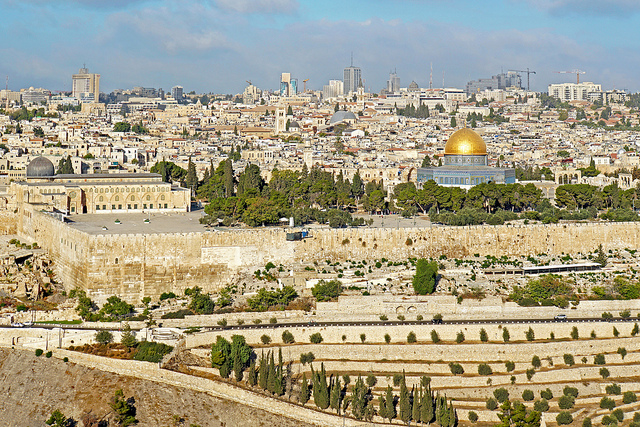Updated
Wishing and False Hopes Won’t Make the Middle East Peace Process Less Relevant – Jean R. AbiNader

Al-Aqsa Mosque and The Dome of the Rock, Old City of Jerusalem Photo: Dennis Jarvis
Jean R. AbiNader
April 25, 2018
Much has been made of the recent whirlwind tour of HRH Prince Mohammed bin Salman (MbS) of Saudi Arabia to Europe and the US, pledging vast amounts to purchase everything from arms to entertainment, while offering investors plenty of opportunities to put Saudi Arabia on their lists of prime partners. There were quite a number of articles wishing the Crown Prince all the best in both reforming the kingdom and opening up the social and cultural boundaries of the country.
At the same time, Israel and its friends are making much of the potential axis between Israel and Saudi Arabia to thwart Iran’s regional ambitions. While both are “real” in the context of wish lists, to assume that the Saudi focus on Middle East peace has somehow diminished received a strong counterpoint during the young prince’s travels, one provided by his father, King Salman, the current ruler of Saudi Arabia.
In a summit, largely ignored by the US media, Arab Heads of States met in the Eastern Province of Saudi Arabia the weekend of April 15. King Salman reaffirmed the Kingdom’s longstanding commitment to the two-state peace process, casting doubt on the Trump Administration’s claims to have brought the Saudis on board through Senior Advisor Jared Kushner’s latest efforts. While some have claimed that Salman’s statement is the result of the lack of Gulf Arab confidence in the US commitment to defang Iran, the deeper historic and cultural importance of Palestine cannot be overlooked.
As Bruce Riedel, writing in Al-Monitor, put it, “Salman opened the summit by renaming it the ‘Jerusalem Summit.’ In his remarks, he said the top priority of the Arab leaders is and should be Palestine. He strongly condemned the Trump administration’s Jerusalem policy. He said the Saudis saw Palestine and Jerusalem as their ‘first issue.’” According to the final communique, “We reaffirm that the Palestine Cause is the entire Arab nation’s main priority, stressing the Arab identity of occupied East al-Quds as the capital of the State of Palestine.” While this may be standard fare for speeches at Arab summits, the growing Iranian presence in the region and the escalation of Israel’s brutal border shootings of demonstrators in Gaza have brought into question any deals that involve the current Israeli government.
The US announcement of moving its embassy to Jerusalem to coincide with Israel’s Independence Day celebration this year has furthered aroused near universal opposition among Arabs. To underscore his point, King Salman pledged financial support to maintain Islamic sites in Jerusalem and in support of UNWRA, which works with Palestinian refugees in Gaza. He also made time to show support for King Abdullah of Jordan, who along with King Mohammed VI of Morocco have special roles in safeguarding the Islamic character of Jerusalem.
The final communique reaffirmed the long-standing opposition of Arab leaders to actions that might alter the legal and political status of Jerusalem, a statement which has had no impact on the current Israeli government that continues to confiscate Palestinian land, build settlements that are deemed illegal by the international community, and subject residents of the West Bank and East Jerusalem to harsh travel and commercial restrictions.
The degree of realism in Israel hinges on the blurry vision of PM Netanyahu. At one time, he is certain that opinion in the Arab world is changing in favor of Israel’s existence and is confident in diminishing Palestinian aspirations, deriding a lack of a Palestinian leadership capable of leading forward on a peace settlement. On the other hand, he does not fully trust the Trump Administration to make hard choices either in Syria or in its overall policy of dealing with Iran, despite the presence of John Bolton, a well-known hawk towards Iran, as National Security Advisor.
Whether or not the MbS charm offensive will reap benefits towards achieving Saudi Arabia’s Vision 2030, the blueprint for economic and social reforms, Palestine will still be waiting for a solution. And if the hostility at the Gaza border is any indication, the fate of the Palestinians will continue to tug at the heart strings of Arab and Muslim peoples, a sentiment their rulers cannot ignore.